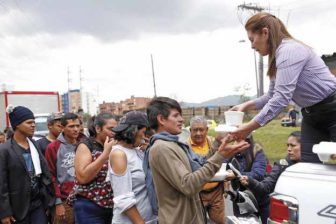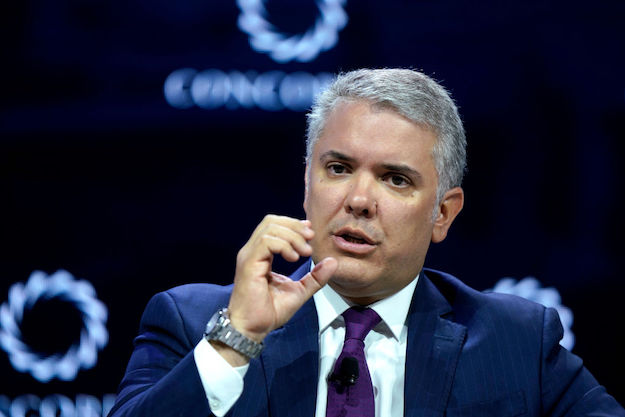The political stalemate that’s frustrated Colombia’s shale oil ambitions for the last five years isn’t over just yet. But a recent government-commissioned report that gives fracking the green light may signal a breakthrough.
The verdict, issued by a 13-person panel of experts from across industry and academia, is not binding, nor is it a blank check for companies wanting to drill. It is instead a set of recommendations to proceed with small-scale pilot projects for fracking under strict conditions such as close monitoring and community buy-in. The government must now weigh those guidelines and decide which regulations to enforce for potential larger commercial developments.
The report will likely have a big impact on energy policy. President Iván Duque inherited a looming energy supply crunch as well as a deficit in any political will to address it. As an independent and rigorous assessment from a range of stakeholders, the inclusive approach taken by the commission lays the groundwork for actions that can jumpstart energy production in Colombia.
Fracking has become near-synonymous with the United States and the global energy revolution that it has unleashed over the past decade. Colombia too has eyed fracking for several years as a means to reverse its dwindling energy supplies. The country’s stock of proven oil reserves sits at 1.7 billion barrels, equal to just 5.7 years of consumption. Oil reserves for state-owned Ecopetrol, Colombia’s largest energy company and a bellwether for domestic industry, are slightly higher at 7.2 years, but that too is low for industry standards. By comparison, reserves for Brazil’s Petrobras and other large international oil companies typically register around 12 years.
The reserves metric is not static; it ebbs and flows with new discoveries. But barring any major oil find, it raises the daunting prospect of Colombia becoming a net oil importer in the near future.
By the government’s estimates, the use of fracking to extract oil and gas could triple Colombia’s proven oil reserves. But the process of busting up shale rocks with water, sand and industrial chemicals to unlock pockets of hydrocarbons – also referred to as “unconventional” developments – is controversial.
The above-ground conditions that have allowed unconventional oil and gas projects to thrive in the U.S. are vastly different in Colombia. Chief among the differences is the alignment of property and resource rights. In the U.S., the fracking boom has largely been a private sector phenomenon: landowners negotiate resource development rights directly with energy companies. In Colombia and elsewhere in Latin America, where natural resources are the patrimony of the state, the script is flipped: the government issues development rights on land that could be privately owned.
This tension is central to natural resource debates in Latin America. It also factors into the stalemate over unconventional oil and gas projects in Colombia. The country’s attractive shale resource potential has been known for many years. In 2014, Colombia’s government auctioned off shale blocks and issued world-class standards for unconventional resource projects following rigorous consultations with technical experts and international regulators. But despite the due diligence and numerous project applications from industry, five years on, not a single permit has been issued for unconventional drilling in Colombia.
Much of the impasse can be chalked up to public skepticism about the environmental risks of fracking, particularly among local communities. When enforcing regulations, environmental authorities at the provincial and federal level have set ever-higher standards for companies, echoing public concerns. Industry likens the process of obtaining an environmental license to aiming at a moving target. In the extreme, companies have described the predicament as an investment trap: they bid on blocks in government auctions but are unable to mobilize capital because they are routinely denied environmental permits.
So what changed?
In one sense, not much. Many of the commission’s recommendations to evaluate unconventional resource projects match the regulatory framework that already exists. The panel, for example, recommended closely monitoring the health of local communities and ensuring robust government oversight throughout pilot projects. Any projects that advance to commercial scale must do so with clear consent from communities, strict environmental baseline data to measure impacts, and stringent government monitoring. None of these are necessarily novel recommendations.
Politically though, the mood has shifted. Duque is fully supportive of the potential that fracking – done right – can have on Colombia’s supply picture and has prioritized the issue. Previous governments also stressed the impact of unconventional sources on national energy supplies, but were never able to create an enforceable standard that addressed delays in environmental licensing.
Duque commissioned the study on fracking’s viability shortly after taking office last year. Now, the green light from an independent body of experts creates legitimacy for the industry among environmental regulators.
The fact that Ecopetrol is leading the pilot programs also establishes a roadmap for action. The company is coming off one of its best years in 2018, with near-record profits and successful exploration results. Going forward, it is pinning much of its strategy on unconventional projects to boost reserves, along with deepwater developments. Over the next three years, Ecopetrol plans to invest $500 million on unconventional resources, starting with the shale pilot programs.
International oil companies from the U.S. and Canada have also applied to operate unconventional oil blocks in Colombia. Operationally, foreign firms backed by international experience with shale have been well-positioned for years to take on those projects. But in a country where fracking is very new, the first objective is to publicly prove the concept of sustainable shale oil and gas projects. Having Ecopetrol first out of the gates is a big step towards earning the public’s trust.
The pilots that Ecopetrol is applying to operate are also in strategic areas. They are located in departments in Colombia’s Middle Magdalena Valley, which is the base of much of Ecopetrol’s production. Communities there are more familiar with energy industry operations and successful pilots should, in theory, transition more easily to commercial developments. Much is riding on the commercial prospects of these areas. Recoverable unconventional oil from one formation alone where Ecopetrol is exploring is estimated to be between 4 and 7 billion barrels.
The process of developing unconventional resources through fracking will still have its detractors. The industry is pushing for a fair chance to prove through accountable and transparent means that it can fulfill the high standards of responsible projects. It appears that a path is being cleared to do so, which could carry enormous benefits for Colombia’s energy outlook.
—
Mendoza is director of the energy program at AS/COA







